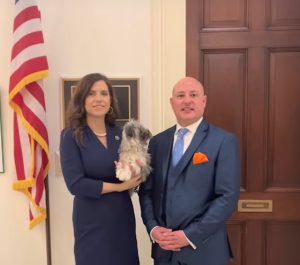Commentary
Commentary: Animal Wellness Action’s Executive Director Praises Rep. Mace’s Work on Mink Farming Ban
This week, U.S. Rep. Nancy Mace, R-Charleston, shepherded a key amendment to end the factory farmed production of minks to passage in the House. In doing so, she not only stood against needless cruelty to animals, but also for all of us in protecting humans against the next new emerging zoonotic disease. Mink are uniquely susceptible to the virus and captive mink on fur farms have already spilled back a mutated form in Denmark and the Netherlands. It will happen here if we don’t do something about it.
Mace’s amendment mirrors the bipartisan Minks In Narrowly Kept Spaces (MINKS) Are Superspreaders Act, H.R. 4310, that she introduced in 2021 with Reps. Rosa DeLauro, D-Conn., Michael McCaul, R-Tex., Peter DeFazio, D- Oregon., Claudia Tenney, R-N.Y., Raul Grijalva, D-Ariz., David Valadao, R-Calif., Jan Schakowsky, D-Ill., Veronica Escobar, D-Texas, and Lance Gooden, R-Texas.
The amendment bans the possession of mink “raised in captivity for fur production,” stopping the routine misery of animals on around 60 farms that have anywhere from a few thousand to 100,000 mink kept in cages. Scientists and public health authorities recognize the health risks are far too great to allow this kind of major cruelty and minor commerce to persist. These American mink farmers almost exclusively export the pelts to elite customers in the People’s Republic of China. In short, our nation is raising mink on factory farms, and taking the risk of an emerging variant, all to supply a small number of Chinese elites with a luxury garment.
The Center for a Humane Economy’s conclusive 102-page report entitled “Mink Farming & SARS-CoV-2,” by former USDA infectious disease expert Jim Keen, D.V.M., Ph.D., details the public health risk associated with mink farms. In practical terms, there are just two species that contract the virus in large numbers and spill it back to other species – humans and mink. There have been outbreaks of COVID-19 at 450 mink farms in North America and Europe, spawning at least three variants. The environment in which factory farmed mink are raised “maximizes chances for intraspecific aggression, viral infections, and mutations,” according to Dr. Keen. And as a result, for public health and safety, jurisdictions including Denmark, France, the Netherlands, and British Columbia have eliminated mink farming as an act of mercy for animals and a bulwark against the emergence of a new variant. The U.S. response is lagging and it’s time to turn that around.
“One of the many lessons we learned at the beginning of the COVID-19 pandemic is the real danger of animal to human transmission of disease,” Mace announced publicly.” “In fact, If COVID-19 could design its perfect habitat for mutation and transmission, it would closely resemble a mink farm, where thousands of mink are kept in small, often unsanitary, overcrowded cages, for days on end.”
In recent years, Saks Fifth Avenue, Neiman Marcus, Macy’s, Bloomingdales, Nordstrom, and every other major fashion retailer, along with the biggest names in design, have ceased fur sales and have acknowledged that confining and factory farming a wild species like mink in cramped, barren cages with little to no room to move around, is clearly archaic and inhumane. We have a wide range of alternatives and real fur has no practical value any longer.
Mace has long been a trailblazer on many fronts, and her focused work on this subject marks the very first time in history that Congress has taken up legislation to crack down on factory farmed animals, no mind looked at ending the entire category of animal exploitation. It parallels a broadly popular effort to end fur farming in Europe.
As fashion trends have changed over the last few decades so has our arcane attitudes towards the animals that share our planet. Fur farming is an antiquated and barbaric practice that has no place in a civilized world. The combination of animal welfare hazards and viral risks does indeed warrant the attention of the nation.
Now it’s time for the Senate to help enact the ban on mink production, and we hope U.S. Sens. Lindsey Graham, R-Central, and Tim Scott, R-Charleston will put their shoulder into this effort to prevent new COVID variants from decimating the population.
Marty Irby is the executive director at Animal Wellness Action in Washington, D.C., who was honored in 2020 by Her Majesty Queen Elizabeth, II for his work to protect animals. Follow him on Instagram, Twitter, and Facebook @MartyIrby.

























